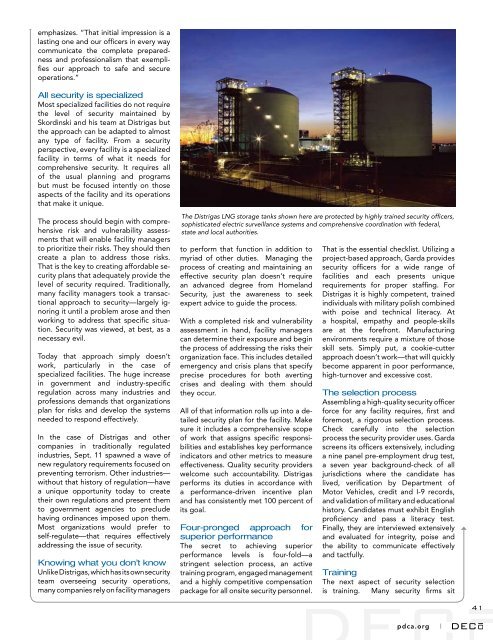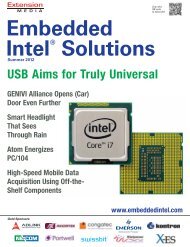n o v/d e c • 2 0 0 8 - Subscribe
n o v/d e c • 2 0 0 8 - Subscribe
n o v/d e c • 2 0 0 8 - Subscribe
You also want an ePaper? Increase the reach of your titles
YUMPU automatically turns print PDFs into web optimized ePapers that Google loves.
emphasizes. “That initial impression is a<br />
lasting one and our officers in every way<br />
communicate the complete preparedness<br />
and professionalism that exemplifies<br />
our approach to safe and secure<br />
operations.”<br />
All security is specialized<br />
Most specialized facilities do not require<br />
the level of security maintained by<br />
Skordinski and his team at Distrigas but<br />
the approach can be adapted to almost<br />
any type of facility. From a security<br />
perspective, every facility is a specialized<br />
facility in terms of what it needs for<br />
comprehensive security. It requires all<br />
of the usual planning and programs<br />
but must be focused intently on those<br />
aspects of the facility and its operations<br />
that make it unique.<br />
The process should begin with comprehensive<br />
risk and vulnerability assessments<br />
that will enable facility managers<br />
to prioritize their risks. They should then<br />
create a plan to address those risks.<br />
That is the key to creating affordable security<br />
plans that adequately provide the<br />
level of security required. Traditionally,<br />
many facility managers took a transactional<br />
approach to security—largely ignoring<br />
it until a problem arose and then<br />
working to address that specific situation.<br />
Security was viewed, at best, as a<br />
necessary evil.<br />
Today that approach simply doesn’t<br />
work, particularly in the case of<br />
specialized facilities. The huge increase<br />
in government and industry-specific<br />
regulation across many industries and<br />
professions demands that organizations<br />
plan for risks and develop the systems<br />
needed to respond effectively.<br />
In the case of Distrigas and other<br />
companies in traditionally regulated<br />
industries, Sept. 11 spawned a wave of<br />
new regulatory requirements focused on<br />
preventing terrorism. Other industries—<br />
without that history of regulation—have<br />
a unique opportunity today to create<br />
their own regulations and present them<br />
to government agencies to preclude<br />
having ordinances imposed upon them.<br />
Most organizations would prefer to<br />
self-regulate—that requires effectively<br />
addressing the issue of security.<br />
Knowing what you don’t know<br />
Unlike Distrigas, which has its own security<br />
team overseeing security operations,<br />
many companies rely on facility managers<br />
The Distrigas LNG storage tanks shown here are protected by highly trained security officers,<br />
sophisticated electric surveillance systems and comprehensive coordination with federal,<br />
state and local authorities.<br />
to perform that function in addition to<br />
myriad of other duties. Managing the<br />
process of creating and maintaining an<br />
effective security plan doesn’t require<br />
an advanced degree from Homeland<br />
Security, just the awareness to seek<br />
expert advice to guide the process.<br />
With a completed risk and vulnerability<br />
assessment in hand, facility managers<br />
can determine their exposure and begin<br />
the process of addressing the risks their<br />
organization face. This includes detailed<br />
emergency and crisis plans that specify<br />
precise procedures for both averting<br />
crises and dealing with them should<br />
they occur.<br />
All of that information rolls up into a detailed<br />
security plan for the facility. Make<br />
sure it includes a comprehensive scope<br />
of work that assigns specific responsibilities<br />
and establishes key performance<br />
indicators and other metrics to measure<br />
effectiveness. Quality security providers<br />
welcome such accountability. Distrigas<br />
performs its duties in accordance with<br />
a performance-driven incentive plan<br />
and has consistently met 100 percent of<br />
its goal.<br />
Four-pronged approach for<br />
superior performance<br />
The secret to achieving superior<br />
performance levels is four-fold—a<br />
stringent selection process, an active<br />
training program, engaged management<br />
and a highly competitive compensation<br />
package for all onsite security personnel.<br />
That is the essential checklist. Utilizing a<br />
project-based approach, Garda provides<br />
security officers for a wide range of<br />
facilities and each presents unique<br />
requirements for proper staffing. For<br />
Distrigas it is highly competent, trained<br />
individuals with military polish combined<br />
with poise and technical literacy. At<br />
a hospital, empathy and people-skills<br />
are at the forefront. Manufacturing<br />
environments require a mixture of those<br />
skill sets. Simply put, a cookie-cutter<br />
approach doesn’t work—that will quickly<br />
become apparent in poor performance,<br />
high-turnover and excessive cost.<br />
The selection process<br />
Assembling a high-quality security officer<br />
force for any facility requires, first and<br />
foremost, a rigorous selection process.<br />
Check carefully into the selection<br />
process the security provider uses. Garda<br />
screens its officers extensively, including<br />
a nine panel pre-employment drug test,<br />
a seven year background-check of all<br />
jurisdictions where the candidate has<br />
lived, verification by Department of<br />
Motor Vehicles, credit and I-9 records,<br />
and validation of military and educational<br />
history. Candidates must exhibit English<br />
proficiency and pass a literacy test.<br />
Finally, they are interviewed extensively<br />
and evaluated for integrity, poise and<br />
the ability to communicate effectively<br />
and tactfully.<br />
Training<br />
The next aspect of security selection<br />
is training. Many security firms sit<br />
pdca.org |<br />
41








